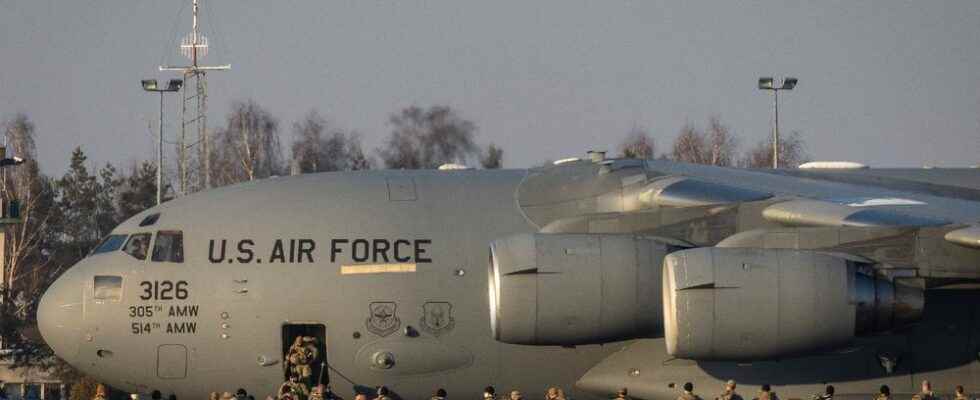This is only his third trip abroad since taking office in January 2021. But again, despite the strategic priority given to Asia, Joe Biden is traveling to the European continent. Like last June, the President of the United States has three major meetings with his allies: with NATO, the G7, then the European Union. But this time, these extraordinary summits will be linked together in one and the same day, this Thursday, March 24, in Brussels, before a trip to Poland on Friday and Saturday.
Washington’s objective: to show the unity of Westerners in the face of the invasion of the Russian army in Ukraine. But also to close ranks a little more, by pushing for stronger sanctions against the regime of Vladimir Putin.
Forgotten, therefore, the failures of the evacuation of Afghanistan decided unilaterally by the White House, or the surprise announcement of the military alliance Aukus (with Australia and Great Britain), burying the giga contract of submarines concluded between Paris and Canberra. Americans and Europeans are now moving forward united in their response to Vladimir Putin. “Joe Biden repaired the damage caused by the presidency of Donald Trump by multiplying the sharing of information and consultations with Europeans, to whom he left the primacy of the announcement of the first sanctions against Russia”, underlines Maya Kandel , director of the United States program at Institut Montaigne.
What energy support from the United States?
The only shadow in this picture: the embargo decreed by the United States concerning Russian energy imports, which the Europeans did not follow. But Washington is aware of their much greater dependence on Russian hydrocarbons (40% of gas imports).
The White House, however, said Westerners should “impose new sanctions on Russia and strengthen existing ones.” Among the options cited: the embargo on European imports of Russian oil. The summit with the EU should also mark the acceleration of plans to rapidly reduce dependence on Russia. In this regard, the White House has promised “joint action to strengthen Europe’s energy security”.
This is enough to increase the pressure on the Kremlin, which has at the same time announced that Russia will no longer accept payments in dollars or euros for gas deliveries to the EU. It remains to be seen whether this will not push the Twenty-Seven, if they refuse to support the rouble, to stop being customers of Moscow. They intend in any case to validate, during the European Council on Thursday, the principle of joint purchases of gas in order to weigh more against Russia.
NATO reinforcement
The NATO summit in which Joe Biden participates will, for his part, ratify a military reinforcement among its members closest to Russia and Ukraine. Secretary General Jens Stoltenberg announced the arrival of “four new battlegroups in Bulgaria, Romania, Hungary and Slovakia”, in addition to the four others already “deployed from the Baltic to the Black Sea”, in particular in the Baltic countries and Poland, where the American president is making his other visit.
US servicemen disembark from a C-17 on the tarmac at Rzeszow airport in southeastern Poland, near the Ukrainian border, on February 16, 2022.
afp.com/Wojtek RADWANSKI
This makes all the more sense since Washington – which has reinforced its presence in Europe in recent weeks, from 80,000 to 100,000 soldiers – has largely done so in Poland (from 4,000 to 9,000 soldiers). But, also, because this country is the main gateway for deliveries of defense equipment to kyiv and the first land of reception for Ukrainians, with nearly 2.2 million refugees arriving in one month. The visit will also make it possible to forget the imbroglio of the Polish Mig-29, which Warsaw had proposed to have delivered to the Ukrainian forces by the Americans, via a base in Germany. A proposal rejected by Washington.
One thing seems certain: this tour of Biden should not call into question his refusal of a more direct involvement of NATO forces alongside kyiv, beyond the supply of weapons and intelligence. “Joe Biden said it in December and then repeated it: he wants to avoid ending up in a face-off between the United States and Russia, which risks leading to a world war between two major nuclear powers”, recalls Maya Kandel.
Joe Biden, who leaves the diplomatic initiative to the Europeans in the war in Ukraine, while showing his loyalty to the transatlantic alliance, could ask them more… about China. “He will not fail to remind them that the strategic threat represented by Beijing, an ally of Russia, also concerns them, explains Maya Kandel. He will ask for a greater common front against China.” Corn Europeans are more reluctant on this issue and much less united.
Clement Daniez
